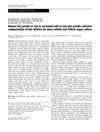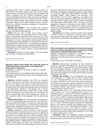Search
for
Sort by
Research
150-180 / 454 results
research The 5α-Reductase Inhibitor Finasteride Is Not Associated With Alterations in Sleep Spindles in Men Referred for Polysomnography
Finasteride doesn't affect sleep spindles in men.

research Stem Cells in the Body
Stem cells regenerate tissues and their behavior varies by environment, suggesting the hematopoietic system model may need revision.

research Hair Pigmentation: A Research Update
Hair color is determined by different melanins and changes with age.

research The Circadian Molecular Clock Creates Epidermal Stem Cell Heterogeneity
The circadian clock affects skin stem cell behavior, impacting aging and cancer risk.

research Effect of Neurosteroid Dehydroepiandrosterone on the Higher Nervous Activity of Old Non-Human Primates
DHEA improved brain function and behavior in old monkeys and had additional health benefits.
research A Kaleidoscope of Keratin Gene Expression and the Mosaic of Its Regulatory Mechanisms
Keratin protein production in cells is controlled by a complex system that changes with cell type, health, and conditions like injury or cancer.

research Molecular Cloning and Expression Analysis of Prostaglandin E Receptor 2 Gene in Cashmere Goat (Capra hircus) Skin During Hair Follicle Development
The PTGER2 gene is highly active in Cashmere goat skin and its activity changes with the hair growth cycle.
research Keratinocyte Stem Cells: Role in Aging
Aging reduces skin stem cell function, leading to changes like hair loss and slower wound healing.

research Towards Best Practice in Hair Metabolomic Studies: Systematic Investigation on the Impact of Hair Length and Color
Hair color and length affect metabolite profiles in hair, so they should be considered in hair analysis.

research DNA Dioxygenases Tet1/2/3 Control Hair Matrix Keratinocyte Differentiation and Hair Shaft Shape via Regulation of Hair Keratin Gene Expression
The enzymes Tet1, Tet2, and Tet3 are important for the development of hair follicles and determining hair shape by controlling hair keratin genes.

research Hair Growth Regulation by the Extract of Aromatic Plant Erica Multiflora
Erica multiflora plant extract can help hair grow by stimulating growth-related cells and triggering hair cycle changes.

research Human Hair Growth Ex Vivo Is Correlated With In Vivo Hair Growth: Selective Categorization of Hair Follicles for More Reliable Hair Follicle Organ Culture
Choosing hair follicles at the same growth stage leads to more consistent hair growth experiments.
research Mitochondrial Dysfunction in Metabolic Syndrome and Inflammatory Skin Disease
Mitochondrial dysfunction links metabolic syndrome and inflammatory skin diseases, suggesting targeted therapies and lifestyle changes.

research Gamma-Aminobutyric Acid Promotes the Inhibition of Hair Growth Induced by Chronic Restraint Stress
GABA contributes to stress-related hair loss, and ginkgolide A may help treat it.

research Sex Hormones and Antiandrogens Influence In Vitro Growth of Dermal Papilla Cells and Outer Root Sheath Keratinocytes of Human Hair Follicles
Certain sex hormones and antiandrogens can either slow down or speed up the growth of human hair follicle cells depending on their concentration.
research The Transcriptional Regulator Prdm1 Is Essential for the Early Development of the Sensory Whisker Follicle and Is Linked to the Beta-Catenin First Dermal Signal
Prdm1 is necessary for early whisker development in mice but not for other hair, and its absence changes nerve and brain patterns related to whiskers.

research Loss of ERBB2 and ERBB3 Receptors Impacts Epidermal Differentiation in Mice
Losing both ERBB2 and ERBB3 receptors in mice causes significant skin problems and inflammation.

research Study of Fecal Glucocorticoid Metabolite in Bears: A Review
Analyzing bear poop helps measure their stress without harming them.

research Direct-To-Consumer Promotion of Prescription Drug Products
Drug companies were interested in advertising directly to consumers to make back their money, but most didn't think it would help and were concerned about negative effects.

research Management of Adult Facial Vascular Anomalies
Treat adult facial vascular anomalies with lasers, surgery, or observation, depending on the patient's specific condition.
research A Meeting of Two Chronobiological Systems: Circadian Proteins Period1 and BMAL1 Modulate the Human Hair Cycle Clock
BMAL1 and Period1 genes can influence human hair growth.
research A Quantitative Technique to Analyze and Evaluate Microstructures of Skin Hair Follicles Based on Mueller Matrix Polarimetry
The technique accurately identifies and evaluates hair follicle structures in skin.

research Chemical Profiling and Quantitation of Bioactive Compounds in Platycladi Cacumen by UPLC-Q-TOF-MS/MS and UPLC-DAD
Researchers identified new compounds in Platycladi Cacumen and found variations in its flavonoid content, which could aid in its quality control.

research Effects of Prasugrel Versus Clopidogrel on Coronary Microvascular Function in Patients Undergoing Elective Percutaneous Coronary Intervention: A Randomized Double-Blind Study
Prasugrel is better than clopidogrel at preventing heart damage and improving blood flow in small heart vessels during heart artery procedures.

research Periodontal Ligament Stem Cells: Regenerative Potency in Periodontium
Periodontal ligament stem cells show promise for regrowing tissues but require more research for safe, effective use.

research Hair Health and Management of Common Hair Disorders
Using the right hair care products can improve hair health and help manage hair disorders.
research In Silico Characterization and Analysis of Clinically Significant Variants of Lipase-H (LIPH Gene) Protein Associated with Hypotrichosis
Three specific mutations in the LIPH gene can cause hair loss by damaging the protein's structure and function.

research A Comparative Study of Materials Assembled from Recombinant K31 and K81 and Extracted Human Hair Keratins
Recombinant keratin materials may better promote skin cell differentiation than natural keratin.

research Worldwide Review of Restrictions Placed Upon People With HIV/AIDS
The review concluded that restrictions on people with HIV/AIDS often violated their rights without proven effectiveness in stopping the virus, highlighting education as the best control method.